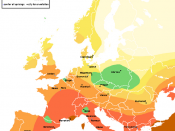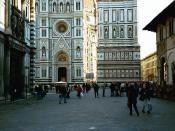Giovanni Villani's chronicle of Florentine history, written before the Black Death, contains a famous chapter entitled 'On the Greatness and State and Magnificence of the Commune of Florence.' The statistics he includes in this chapter place Florence among the five most populous cities in Europe in 1338; only Paris, Venice, Milan, and Naples were larger in size. Florence was also one of Europe's wealthiest cities, in a large part due to the production and sale of woollen cloth, the value of which exceeded one and one-half million florins a year. However, Villani's 'survey of the city in 1338 represents a climax [in his chronicle], depicting the city at the height of its power.' From this point on the leading families of Florence had the enormous task of maintaining, - one could argue, in the general interest of the population -if not expanding, Florence's size, wealth and importance in Europe.
To give sufficiently detailed analysis of both the patrician regime's domestic and foreign policies requires more scope than that which is available; therefore, this essay will concentrate on the domestic policy of the leading families of Florence.
It is imperative to examine the structure of the commune's political constitution in this period, before even considering any assessment of its performance. Florence was an independent communal regime, and due to its rise in fortune and thus the rise in importance of its mercantile and professional classes, its constitution - on paper at least - was remarkably egalitarian for a medieval city. The most important element of central government was the Signoria; it comprised of eight priors, two appointed from each of the four districts, and the gonfalonier of justice. Even though these nine positions were equally important, the position of gonfalonier of justice - who acted as chairman - carried with...


